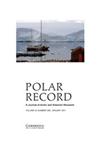Is it real? Science diplomacy in the Arctic states’ strategies
IF 1.6
4区 环境科学与生态学
Q3 ECOLOGY
引用次数: 3
Abstract
Abstract Dominant geopolitical narratives on the Arctic argue that the region is either edging towards conflict or international law is respected and peace is maintained through cooperation to address shared concerns. While both of these narratives are present in the Arctic states’ strategies, most of them tend to support collaborative efforts. Science diplomacy (SD) is a useful mechanism in this regard as it helps states overcome potential disagreements and can stimulate cooperation in other areas. Given the growing concerns about global risks, SD is more important now than ever before. In our study, we identify and focus on three indicators for potential SD in the Arctic strategies: i) scientific infrastructure; ii) membership in intergovernmental/interparliamentary and scientific/education organisations and networks and iii) specific areas of scientific cooperation. Considering the intensive scientific activity in the region, it is not surprising that the strategies discuss different forms of research and scientific cooperation, although none explicitly use the term “science diplomacy”. Nevertheless, our analysis reveals the Arctic states do apply the SD concept in their strategies and use three types of diplomacy – science in diplomacy, science for diplomacy or diplomacy for science – in the three indicators.这是真的吗?北极国家战略中的科学外交
关于北极的主流地缘政治观点认为,要么北极正在走向冲突,要么尊重国际法,通过合作解决共同关切来维护和平。虽然这两种说法都存在于北极国家的战略中,但其中大多数倾向于支持合作努力。在这方面,科学外交(SD)是一个有用的机制,因为它帮助各国克服潜在的分歧,并能促进其他领域的合作。鉴于对全球风险的担忧日益加剧,可持续发展现在比以往任何时候都更加重要。在我们的研究中,我们确定并关注了北极战略中潜在可持续发展的三个指标:1)科学基础设施;Ii)政府间/议会间和科学/教育组织和网络的成员资格;iii)科学合作的特定领域。考虑到该地区密集的科学活动,这些战略讨论了不同形式的研究和科学合作也就不足为奇了,尽管它们都没有明确使用“科学外交”这个术语。然而,我们的分析表明,北极国家确实在其战略中应用了可持续发展概念,并在三个指标中使用了三种类型的外交——外交中的科学、为外交的科学或为科学的外交。
本文章由计算机程序翻译,如有差异,请以英文原文为准。
求助全文
约1分钟内获得全文
求助全文
来源期刊

Polar Record
环境科学-环境科学
CiteScore
1.40
自引率
25.00%
发文量
26
审稿时长
>36 weeks
期刊介绍:
Polar Record is an international, peer-reviewed scholarly periodical publishing results from a wide range of polar research areas. The journal covers original primary research papers in the humanities, social sciences, physical sciences, life sciences, and polar technology, as well as papers concerning current political, economic, legal, and environmental issues in the Arctic or Antarctic. Polar Record endeavours to provide rapid publication, normally within nine months of initial submission.
 求助内容:
求助内容: 应助结果提醒方式:
应助结果提醒方式:


